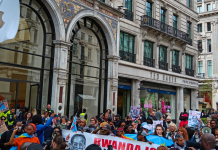Zakir Gul argues that the axing of ‘community languages’ at A level reveals the government’s contempt for Britain’s ethnic minorities and their heritages.

White just got whiter. Examination boards AQA and OCR have decided to axe several essential languages at A level. The list includes Bengali, Punjabi, Gujarati, Polish, Turkish and Persian. The British government’s approach towards language education in Britain is revealed in its disregard for the country’s demography. By failing to recognise such languages within the education system, the government is forsaking its duty towards Britain’s largest ethnic minority communities and their heritages.
The educational establishment’s distinction between ‘modern languages’ and ‘community languages’ is hypocritical and racist. Though there are more Punjabi speakers than there are French or German worldwide, Punjabi will never be a ‘modern language’, for such a categorisation is part and parcel of a white curriculum resolute to upholding white hegemony. The term ‘modern’ reeks of Eurocentricity, that we – speakers of Western European languages – are inheritors of ‘progress’, ‘reason’, and other Enlightenment-era concepts, whereas you – the Other – are negatively defined as stagnant, outdated, and, as we are constantly reminded, lacking in usefulness.
Why is it that English, French, German, and all other ‘useful’ ‘modern languages’ are spoken so widely throughout the world today? The answer is in imperialism and colonialism. European powers – supposedly sanctioned by Deus, Dieu, Gott, God et al. – plundered the wealth and resources of the world right over; in many cases, completely eradicating and replacing the existing languages of the colonised peoples, and with it, their heritage and being. How English came to be the most widely-spoken language in Australia and North America, or Spanish in South America, is a story of the genocide of millions of these continents’ native populations, and the enforcement of colonial languages upon those who survived.
When was the last time the Bengal invaded and occupied another country, forcing its language and customs upon another people? (The Bengal was the richest region on earth prior to the arrival of the British, left partitioned and decimated upon their exit.) Despite this, there are over 220 million native speakers of Bengali worldwide today. More pressingly, on a domestic level, there are more speakers of Bengali in Britain than there are speakers of all the so-called ‘modern languages’ combined within our country. So why are languages such as Bengali not prioritised in education, or at least ranked with equal importance to French, German, or even Latin? The demographics speak volumes. Second to English, a 2011 census revealed that there are 546,000 people with Polish as their mother tongue in the United Kingdom, along with 273,000 Punjabi, 221,000 Bengali, and 213,000 Gujarati first-language speakers.
Yet our government does not care about such demographics. They do not care that the languages of the four largest minority groups within the country are being scrapped wholly at A level and partly at GCSE. They do not care that they are denying a future generation the vocabulary to access its past. “Why don’t you learn Punjabi at the Gurdwara”, they ask, or “Why don’t you pay for a private tutor to teach you Polish over weekends?” They continue to oversee the most drastic changes in education in decades, pushing through neoliberal reforms and pandering to privilege under the guise of austerity, endowing a secure future only to those who can afford it.
Though several MPs have come out and criticised the dropping of ‘community languages’ within the A level curriculum, the rhetoric – both right and left – continues to remain predicated on the same economistic, reductive argument. Take the comments of Nick de Bois, Tory MP for Enfield North, for example:
“We are seeking to deliver on the government’s pledge and target to build exports across the globe and to maintain strong trading arrangements with the EU. We will, therefore, need fluent, well-educated people to build our relationships with Turkey, Poland, Iran, Bangladesh and other countries. We will need language skills to do business with many of those countries”.
Shadow education secretary Tristram Hunt – whose words embody the faux olive branch Labour are trying to offer us – has repeated the same message verbatim:
“Precisely at the time we need to be harnessing our entrepreneurial capital and soft power in the new emerging economies, the Government’s actions will lead to fewer young people being able to take A levels in Portuguese, Turkish, Gujarati and Punjabi.”
The spineless sell-outs of the political class and establishment, who know the price of everything at the value of nothing, speak of ‘language’ in precisely the same manner about which they speak of the ‘immigrant’: as a profit- or loss-making commodity, reducible to the cash nexus. We’re the ones who will have to bear the climate of xenophobia and hatred that they have stirred up and allowed to ferment. We suffer abuse from our neighbours rallying behind the racist populism of Nigel Farage when he claims to feel “uncomfortable” on public transport where foreign languages are spoken. We suffer when media personalities such as David Starkey get away with stating that sex trafficking gangs are a cultural niche “entrenched in the foothills of the Punjab”. Our society is racist, and our politicians are making it worse.
And who are the ones that lose out here? A lost generation of language users, suspended between the ‘mother tongue’ and English. We suffocate in the middle, barely able to fathom a conversation with our grandparents, knowing only fluency in a tongue that is not home. As Marcus Garvey said, a people without the knowledge of their past history, origin and culture are like a tree without roots. Who will give us the vocabulary to understand our roots, the roots of our parents and their struggles, and the struggles of those who came before, if not the schools? We look back and we are displaced. We look forward and speak English, but we will never be white. We have been betrayed by the education system. We have been abandoned by the government. They do not represent us.
Zakir Gul is on the national committee of the National Campaign Against Fees and Cuts.


















[…] out ethnic enclaves to make way for luxury apartments. It’s linked to the violence that cuts funding for ‘community’ language classes, and the violence that prevents you from speaking for fear of showing your accent. The systems in […]
So right.